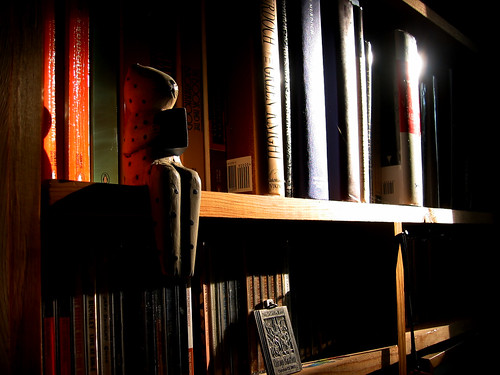
{Photo by rocketlass.}
Today was yet a great day in my ongoing love affair with the Internet, one of those days that, in a real-life love affair, you mark with sappy little stars and hearts (or some impenetrable code, if you're that sort) in your daily planner, the better to remember it years later when age and familiarity have dulled the power of that moment's passion.
Quite a build-up, no? Well, see what you think . . .
It started with a Tweet yesterday from Chicago blogger (and Robert Walser booster) Sam Golden Rule Jones:
One thing I learned from [Derwent] May['s history of the TLS]: Max Beerbohm wrote an article on imaginary books (like Ed Park's recent NYT piece) in 1914.Those of you regular readers who are familiar with Ed's and my Invisible Library project will instantly see why I perked up: Ed remembered coming across the term "Invisible Library" several years ago in the wonderful OuLiPo Compendium edited by Harry Mathews, and soon after we launched our library we learned of some earlier attempts, but if Beerbohm was already on the case back before World War I, that would dramatically extend the pedigree of Invisible Librarianship!
Alas, neither Sam nor I had access to the TLS archives, so it appeared a trip to the library was in order--and then the library came to me, in the form of a kindly e-mail from Dave Lull, Omnipresent Wisconsin Librarian, who had found Beerbohm's article, "Books within Books," originally published in the 12 March 1914 issue.
And oh, the pleasures to be found therein! Beerbohm, always a pleasant stylist, has great fun with the concept:
They must, I suppose, be classed among biblia abiblia. Ignored in the catalogue of any library, not one of them lurking in any uttermost cavern under the reading-room of the British Museum, none of them ever printed even for private circulation, these books written by this and that character in fiction are books only by courtesy and good will.After bringing in Charles Lamb for some pointed commentary about books that actually do get published, regardless of their deficiency of merit, Beerbohm admits that,
I am shy of masterpieces; nor is this merely because of the many times I have been disappointed at not finding anything at all like what the publishers expected me to find.No, even the recommendation of "a few highly literary friends" can be more problematic than helpful:
But so soon as I am told that I "must" read this or that, and have replied that I instantly will, I become strangely loth to do anything of the sort.The appeal of books within books, as the quote I've taken for the headline of this post indicates, lies partly in their not being there looming over us, unread, on our shelves. They can never, however inadvertently, make us feel inadequate or ill-informed . . .
And yet--for, even as Must implants distaste, so does Can't stir sweet longings--how eagerly would I devour these books within books!So true: what I would give to read J. G. Quiggins's Unburnt Boats or Nick Jenkins's Fellow Member?
Beerbohm goes on to run through an extensive gathering of invisible books, taking the simultaneously frustrating and admirable approach of rarely noting the real-world books in which they appear. Any fan of the Invisible Library will find the whole essay worth reading; it's convinced me to order a used copy of the Beerbohm collection in which it appeared, And Even Now (1921).
Now back to my opening contention: though I've met Ed Park, our friendship came about primarily because of the Internet (with an assist from a shared appreciation of John Crowley); Sam Golden Rule Jones I know only through his online writing; Dave Lull I know only through the traces he leaves--of intelligence, wide reading, discriminating taste, and unstinting generosity--throughout the Internet. Could even the most technophobic deny that this is a red letter day for this greatest of communications media?
Your link to "Invisible Library" is broken.
ReplyDelete(Oh and also -- I just noticed the works of Herbert Quain are not listed in the Invisible Library -- surely they deserve a place among the the underused Q's?
ReplyDeleteFixed it--thanks!
ReplyDeleteAnd you're right about Herbert Quain. That's a serious oversight.
James Branch Cabell's Beyond Life (1919) also features a library of imaginary books, including books by fictional characters and books as their authors intended them.
ReplyDeleteBeerbohm might not have liked it, but Enoch Soames is back! Enoch never thought Beerbohm did right by him anyway . . . (@enoch_soames, and http://enochsoames.tumblr.com)
ReplyDelete